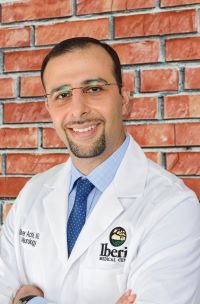What is Aphasia?
POSTED: 8/5/2022

What is Aphasia?
Friday, August 5, 2022
What is aphasia?
Aphasia, pronounced “a-fa-ze-a”, is the partial or complete loss of speech/communication. More specifically in Neurology, a patient is diagnosed with aphasia when one or more components of language become absent or impaired.

Language is a complex neurological task that consists of five major components: comprehension, repetition, naming, reading, and writing. In addition to these components, the Neurologist will often assess the patient’s fluency and content of speech. These components are accomplished by various portions of the human brain and therefore different types of aphasia exist depending on the portion of the brain that is injured.
The brain is divided into two major portions referred to as hemispheres. The components of language can be housed in either the right or left hemisphere. In the western world, 80-90% of people are right handed indicating their left hemisphere is dominant and likely where the language center is located. In contrast, 10-20% of people are left handed indicating right hemispheric dominance and language presence.
Causes of aphasia:
Any process that damages the language center of the brain can result in aphasia. The speed with which aphasia occurs can favor certain causes over others. In the acute setting, the most common cause of aphasia is a stroke, whether ischemic (clot) or hemorrhagic (bleed). Other acute causes of language dysfunction include a severe migraine, infection of the brain, and an attack of multiple sclerosis that results in inflammation in the language center.
Subacute causes of aphasia include encephalitis, an inflammatory disorder of the brain, brain abscess (“pus” collection), and brain neoplasm (mass/growth). Progressive and chronic causes of aphasia include certain epilepsy disorders (such as Landau-Kleffner syndrome) and certain dementia syndromes (such as primary progressive aphasia, frontotemporal dementia, and Alzheimer dementia).
Aphasia classification:
As previously indicated, there are different types of aphasia depending on what components of language are absent or impaired. This discussion is beyond the scope of this article, but below is a list of the common aphasia syndromes.
Broca’s aphasia: also known as expressive aphasia occurs when damage takes place in the dominant inferior frontal lobe (Broca’s area). This aphasia is characterized by loss of fluent speech production and repetition with relative sparing of comprehension. This patient is typically unable to produce any intelligent speech.
Wernicke’s aphasia: also known as receptive aphasia occurs when damage takes place in the dominant temporal lobe (Wernicke’s area). This aphasia is characterized by loss of comprehension of spoken speech and writing with preservation of speech production. This patient typically speaks fluently but their speech usually does not make much sense and is often referred to as “word salad”.
Conduction aphasia: is an aphasia that occurs when the nerves connecting the speech center and comprehension center are damaged. Therefore, this aphasia is characterized by intact comprehension and fluent production of speech, however, a loss of the ability to repeat.
Global aphasia: as implied by the name, this is an aphasia syndrome that is characterized by loss of all language function. This is a patient who is unable to produce any words, but perhaps mild sounds, and does not respond to communication and often is mute. This aphasia is often associated with other neurological deficits such as vision field loss and unilateral weakness.
Anomic aphasia: this is an aphasia syndrome characterized by an isolated loss of the ability to name objects. The patient with this aphasia is able to described what something is used for but they are not able to state or write its name.
Diagnosis and treatment of aphasia:
The diagnosis of aphasia is a clinical one easily accomplished at the bedside by testing the components of language discussed above. By initiating a conversation with the patient, the Neurologist is very quickly able to determine the presence of language dysfunction. That being said, additional tests are often employed to further determine the underlying cause of the aphasia. For instance, a brain MRI can help demonstrate damage to the language center from stroke, multiple sclerosis, abscess, or brain tumor. A lumbar puncture or “spinal tap” is useful in determining the presence of encephalitis or infection. An EEG is very useful in determining the presence of epilepsy as the cause of aphasia. And lastly, formal cognitive testing referred to as neuropsychological evaluation is helpful in determining the presence and type of dementia.
The treatment of aphasia is largely dependent on the underlying cause. There is no one size fit all approach to treating aphasia. In the case of an ischemic stroke, patients are given thrombolytics (blood clot dissolving medication) to restore blood flow to the language center. In the case of a brain tumor, resection of the mass is typically done with possibly radiation therapy. In the case of an abscess, antibiotics and a washout of the brain is typically done. In the case of inflammatory diseases of the brain, intravenous steroids are often administered. In the case of dementia, medications to improve cognitive function can be tried. And in the case of epilepsy, medications that lower seizure threshold are often prescribed. Regardless of the underlying cause however, patients with aphasia are subjected to aggressive speech therapy with a speech and language pathology therapist. In most cases, the treatments are not curative but can drastically improve the outcome of the aphasia victim, especially when coupled with therapy.
If you or a loved worry about having aphasia, please contact the Neurology clinic for an evaluation. We hope you find this article helpful and enjoyable.
Monthly Aphasia Support Group at Iberia Medical Center Main Campus. Learn more: https://www.iberiamedicalcenter.com/news/aphasia-support-group-at-iberia-medical-center
Dr. Oliver Achi, Neurologist, Medical Director of Neurology Services, Iberia Medical Center
Appointments with Dr. Achi: 337.374.7242
